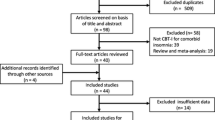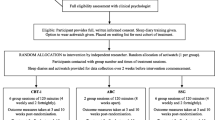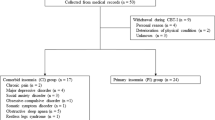Abstract
The purpose of the current study was to examine the effects of cognitive behavior therapy (CBT-I) for insomnia on patients with insomnia co-morbid with hearing impairment. A randomized controlled design was used with a 3-month follow-up. Thirty-two patients with insomnia co-morbid with hearing impairment were randomized to either CBT-I or a waitlist condition (WLC). The primary outcome was insomnia severity. Secondary outcomes were sleep diary parameters, dysfunction, anxiety, and depression. Compared to WLC, CBT-I resulted in lower insomnia severity at post-treatment and at follow-up (d = 1.18–1.56). Relative to WLC, CBT-I also led, at both assessment points, to reduced total wake time (d = 1.39) and increased sleep restoration (d = 1.03–1.07) and sleep quality (d = 0.91–1.16). Both groups increased their total sleep time, but no significant group difference emerged. Compared to WLC, CBT-I resulted in higher function (d = 0.81–0.96) and lower anxiety (d = 1.29–1.30) at both assessment points. Neither CBT-I nor WLC led to improvement on depression. Based on the Insomnia Severity Index, more CBT-I (53–77%) than WLC participants (0–7%) were treatment responders. Also, more CBT-I (24%) than WLC participants (0%) remitted. In patients with insomnia co-morbid with hearing impairment, CBT-I was effective in decreasing insomnia severity, subjective sleep parameters, dysfunction, and anxiety. These findings are in line with previous results on the effects of CBT-I in other medical conditions.
Similar content being viewed by others
References
American Psychiatric Association. (2000). Diagnostic and statistical manual of mental disorders (4th ed., text revision). Washington, DC: American Psychiatric Association.
Andersson, G., Lyttkens, L., & Larsen, H. C. (1999). Distinguishing levels of tinnitus distress. Clinical Otolaryngology, 24, 404–410.
Asplund, R. (2003). Sleepiness and sleep in elderly subjects with hearing complaints. Archives of Gerontology and Geriatrics, 36, 93–99.
Axelsson, A., & Ringdahl, A. (1989). Tinnitus: A study of its prevalence and characteristics. British Journal of Audiology, 23, 53–62.
Bastien, C. H., Vallieres, A., & Morin, C. M. (2001). Validation of the Insomnia Severity Index as an outcome measure for insomnia research. Sleep Medicine, 2, 297–307.
Bélanger, L., Vallières, A., Ivers, H., Moreau, V., Lavigne, G., & Morin, C. M. (2007). Meta-analysis of sleep changes in control groups of insomnia treatment trials. Journal of Sleep Research, 16, 77–84.
Carney, C. E., Ulmer, C., Edinger, J. D., Krystal, A. D., & Knauss, F. (2009). Assessing depression symptoms in those with insomnia: An examination of the Beck Depression Inventory, second edition (BDI-II). Journal of Psychiatric Research, 43, 576–582.
Cohen, J. (1988). Statistical power analyses for the behavioural sciences. Hillsdale: Erbaum.
Crönlein, T., Langguth, B., Geisler, P., & Hajak, G. (2007). Tinnitus and insomnia. Progress in Brain Research, 166, 227–233.
Currie, S. R., Wilson, K. G., Pontefract, A. J., & deLaplante, L. (2000). Cognitive-behavioral treatment of insomnia secondary to chronic pain. Journal of Consulting and Clinical Psychology, 68, 407–416.
Danermark, B., & Gellerstedt, L. C. (2004). Psychosocial work environment, hearing impairment and health. International Journal of Audiology, 43, 383–389.
Devilly, G. J., & Borkovec, T. D. (2000). Psychometric properties of the Credibility/Expectancy Questionnaire. Journal of Behavior Therapy and Experimental Psychiatry, 31, 73–86.
Edinger, J. D., Bonnet, M. H., Bootzin, R. R., Doghramji, K., Dorsey, C. M., Espie, C. A., et al. (2004). Derivation of research diagnostic criteria for insomnia: Report of an American Academy of Sleep Medicine Work Group. Sleep, 27, 1567–1596.
Edinger, J., Kirby, A., Lineberger, M., Loiselle, M., Wohlgemuth, W., & Means, M. Duke Structured Interview Schedule for DSM-IV-TR and International Classification of Sleep Disorders, Second Edition (ICSD-2): Sleep Disorder Diagnoses. Unpublished manual.
Ellis, J. G., Gehrman, P., Espie, C. A., Riemann, D., & Perlis, M. L. (in press). Acute insomnia: Current conceptualizations and future directions. Sleep Medicine Reviews.
Espie, C. A., Fleming, L., Cassidy, J., Samuel, L., Taylor, L. M., White, C. A., et al. (2008). Randomized controlled clinical effectiveness trial of cognitive behavior therapy compared with treatment as usual for persistent insomnia in patients with cancer. Journal of Clinical Oncology, 26, 4651–4658.
European Concerted Action Project on Genetics of Hearing Impairment (HEAR) (1996). Study group on terminology, definition and hearing assessment (1996). Newsletter No 2 (http://www.gendeaf.org).
First, M. B., Gibbon, M., Spitzer, R. L., & Williams, J. B. W. (1997). Structured Clinical Interview for DSM-IV Axis I Disorders: Clinician Version. Washington, DC: American Psychiatric Press.
Harvey, A. G., Sharpley, A. L., Ree, M. J., Stinson, K., & Clark, D. M. (2007). An open trial of cognitive therapy for chronic insomnia. Behaviour Research and Therapy, 45, 2491–2501.
Jernelöv, S., Lekander, M., Blom, K., Rydh, S., Ljótsson, B., Axelsson, J., et al. Efficacy of a behavioral self-help treatment with or without therapist guidance for insomnia with co-morbid problems. Submitted manuscript.
Klockhoff, I., & Lindblom, U. (1967). Meniére′s disease and hydrochlorothiazide (Dichlotride®): A critical analysis of symptoms and therapeutic effects. Acta Otolaryngologica (Stockholm), 63, 347–365.
Lasisi, A. O., & Gureje, O. (2011). Prevalence of insomnia and impact on quality of life among community elderly with tinnitus. Annals of Otology, Rhinology and Laryngology, 120, 226–230.
Lichstein, K. L. (2006). Secondary insomnia: A myth dismissed. Sleep Medicine Reviews, 10, 3–5.
Lichstein, K. L., Durrence, H. H., Taylor, D. J., Bush, A. J., & Riedel, B. W. (2003). Quantitative criteria for insomnia. Behaviour Research and Therapy, 41, 427–445.
Lichstein, K. L., Riedel, B. W., & Grieve, R. (1994). Fair tests of clinical trials: A treatment implementation model. Advances in Behaviour Research and Therapy, 16, 1–29.
Morgan, K., Dixon, S., Mathers, N., Thompson, J., & Tomeny, M. (2003). Psychological treatment for insomnia in the management of long-term hypnotic drug use: A pragmatic randomised controlled trial. British Journal of General Practice, 53, 923–928.
Morin, C. M. (1993). Insomnia: Psychological assessment and management. New York: Guilford Press.
Morin, C. M., Bootzin, R. R., Buysse, D. J., Edinger, J. D., Espie, C. A., & Lichstein, K. L. (2006). Psychological and behavioral treatment of insomnia: An update of recent evidence (1998–2004). Sleep, 29, 1396–1406.
Morin, C. M., Vallieres, A., Guay, B., Ivers, H., Savard, J., Merette, C., et al. (2009). Cognitive behavioral therapy, singly and combined with medication, for persistent insomnia: A randomized controlled trial. JAMA, 301, 2005–2015.
Mundt, J. C., Marks, I. M., Shear, M. K., & Greist, J. H. (2002). The Work and Social Adjustment Scale: A simple measure of impairment in functioning. British Journal of Psychiatry, 180, 461–464.
Ohayon, M. M. (1997). Prevalence of DSM-IV diagnostic criteria of insomnia: Distinguishing insomnia related to mental disorders from sleep disorder. Journal of Psychiatric Research, 31, 333–346.
Okajima, I., Komada, Y., & Inoue, Y. (2011). A meta-analysis on the treatment effectiveness of cognitive behavioral therapy for primary insomnia. Sleep and Biological Rhythms, 9, 24–34.
Rybarczyk, B., Lopez, M., Benson, R., Alsten, C., & Stepanski, E. (2002). Efficacy of two behavioral treatment programs for comorbid geriatric insomnia. Psychology and Aging, 17, 288–298.
Rybarczyk, B., Stepanski, E., Fogg, L., Barry, P., Lopez, M., & Davis, A. (2005). A placebo-controlled test of cognitive-behavioral therapy for comorbid insomnia in older adults. Journal of Consulting and Clinical Psychology, 73, 1164–1174.
Savard, J., Simard, S., Ivers, H., & Morin, C. M. (2005). Randomized study on the efficacy of cognitive-behavioral therapy for insomnia secondary to breast cancer, part I: Sleep and psychological effects. Journal of Clinical Oncology, 23, 6083–6096.
Smith, M. T., Huang, M. I., & Manber, R. (2005). Cognitive behavior therapy for chronic insomnia occurring within the context of medical and psychiatric disorders. Clinical Psychology Review, 25, 559–592.
Spoormaker, V. I., Verbeek, I., van den Bout, J., & Klip, C. (2005). Initial validation of the SLEEP-50 questionnaire. Behavioral Sleep Medicine, 3, 227–246.
Stepanski, E. J., & Rybarczyk, B. (2006). Emerging research on the treatment and etiology of secondary or comorbid insomnia. Sleep Medicine Reviews, 10, 7–18.
Taylor, D. J., Mallory, L. J., Lichstein, K. L., Durrence, H. H., Riedel, B. W., & Bush, A. J. (2007). Comorbidity of chronic insomnia with medical problems. Sleep, 30, 213–218.
Zigmond, A. S., & Snaith, R. P. (1983). The Hospital Anxiety and Depression Scale. Acta Psychiatrica Scandinavica, 67, 361–370.
Acknowledgment
We would like to express our appreciation to Sparbankstiftelsen Nya for funding and to the two audiology clinics in Örebro and Karlstad for recruitment.
Author information
Authors and Affiliations
Corresponding author
Rights and permissions
About this article
Cite this article
Jansson-Fröjmark, M., Linton, S.J., Flink, I.K. et al. Cognitive-Behavioral Therapy for Insomnia Co-Morbid with Hearing Impairment: A Randomized Controlled Trial. J Clin Psychol Med Settings 19, 224–234 (2012). https://doi.org/10.1007/s10880-011-9275-y
Published:
Issue Date:
DOI: https://doi.org/10.1007/s10880-011-9275-y




